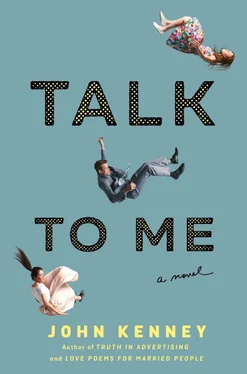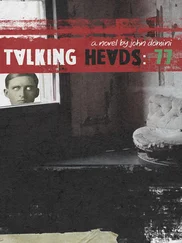But know this, my round-bottomed friend, Claire wanted to say aloud. Know that he will worship your gift-of-a-body more than you, the person, the soul. He will conflate you and your body. It is what men do. He will partially listen to you. When you think that he’s being sensitive and engaged, chances are what he will really be thinking about will be turkey sausage. Or a pair of big boobs in a tight sweater he saw on the subway. Or a female colleague who bent over a desk to reach for a sheaf of papers. He will fight his Neanderthal instincts to respond in a way that makes you think you have one of the few good men. The early days of your relationship will be the wonder days, where you can’t believe it’s happened, that you’ve met someone like this, when you sleep late on a weekend and eat meals at odd hours and wander the city and talk in bed until the sky gets light, your energy and craving for each other, for life itself, seemingly boundless.
But it will change. Slowly at first. Then powerfully. Children. He will see you differently and you will see it in his eyes. The way he doesn’t look at you. The way he looks at younger women at parties you attend. How work and money and position will hold tremendous sway. How he will come home and talk only about himself, if he talks at all. How you will long for him to ask about your day. How your confidence and self-esteem, once so strong, will ebb. Is it me? you’ll wonder. Am I doing something wrong? No, you’re not. Which makes it all the worse. After the arguments, the fights, the ones that seem to happen more frequently as the years progress, notice how he comes up behind you at the sink, when you are doing the dishes, after the baby is down, you thinking about the laundry that has to be done, the shopping, feeling about as sexual as a lug wrench, when he, having caught sight of your ass, a distracted woodland animal, presses up against you, and reaches around to hold your breasts, when all you wanted was a “sorry,” a hug that did not involve his hands on your ass. Is that so hard?
She wanted to tell the girl. Tell both of them. Be careful, she wanted to say. There’s an accident up ahead. Avoid it. But they wouldn’t listen. She also wanted to tell them that, if you were lucky, you might even meet a man like Dodge, who, you hoped, could save your life.
• • •
They walked through the Frick, Dodge occasionally brushing against her shoulder. He smelled like sandalwood. They looked at the paintings, an exhibit of Van Dyck. Claire stared, unable to comprehend that someone had moved his hand in such a way as to create what appeared to be alive. They walked slowly in the quiet, peeling off to look at pictures in their own time, Dodge ahead of her, assuming the stance of a regular museumgoer, hands intertwined behind his back, leaning forward at the waist. He loved art but was eager to get to dinner, to a glass of wine, to his apartment, where he could remove Claire’s clothes.
Claire was staring at a particular picture, a portrait of two children. Elizabeth and Anne . The write-up on the wall next to the drawing told the history, how Van Dyck had become the favorite painter of King Charles the First of England and his wife, Queen Henrietta Maria. At the time of Van Dyck’s painting, the royal couple had five children, Charles, Mary, James, Elizabeth, and Anne. Henrietta gave birth to nine children, two of whom were stillborn.
Claire read this and then read it again. She leaned closer. It hit her, the feeling, so fast, so suddenly, that her eyes welled. She blinked and leaned even closer. A docent startled her when he gently asked if she could not lean so close.
She was embarrassed, mostly because she had tears on her cheeks. Dodge turned to look at her but Claire quickly made her way to the ladies’ room, where she sat in a stall with the lid of the toilet down, staring at her shoes, trying to muffle sobs with a wad of toilet tissue. So strange, she thought, observing herself. She’s not a crier. Stoic. Strong. A New England Ford. Don’t whine. Keep moving. And yet something about the painting, those two children.
After Franny, who was so hard to conceive, they had tried again. So many tests, so much disappointment. And then, the little miracle. A boy. Walt. An emergency C-section at thirty-six weeks. Stillborn.
The effect this has on a person. On a mother. The sadness of it. Do you compensate, perhaps, by loving your only child too much? Can you love a child too much? Can you give in too easily? Overlook traits and behavior that to someone perhaps a bit less wounded would be obvious? Do you, perhaps, spoil them? Act as a mother bear when the child’s father raises his voice, even when warranted?
She stood and stepped out of the stall, washed her hands and splashed a little cold water on her face. She rarely wore makeup, the good fortune of high coloring and fine skin. She blinked several times, reapplied her lipstick, let her hair out of the bun she’d had it in and reset it.
When she walked out Dodge put a hand gently upon her shoulder, his face contorted with confusion and pain. “Are you okay?”
Claire touched his cheek, smooth from a recent shave. She was happy to see his face. She wanted to feel good. She wanted desperately to be happy.
They had dinner at a small Italian place between Madison and Fifth, a place where they knew Dodge. The food was very good. They drank wine and, later, espresso. They split a tiramisu. A short walk back to Dodge’s five-thousand-square-foot apartment, where they slowly undressed each other. And then Claire lay down with a man other than Ted for the first time in over thirty years (fine, it was their seventh time). She was blissfully unaware of the calls from Franny, the texts. Or the texts from Nancy. Or from Ted. Or from her own lawyers, giddy with excitement at the potential ruin they could inflict on Ted. She hadn’t remembered that she’d turned the ringer of her phone off at the museum, that the battery had drained to nothing. Dodge was whispering in her ear in the quiet and the dark.
• • •
It started as a barely palpable heartbeat. A minuscule speck of data among the two billion users of Facebook. A microscopic dot among the more than two hundred billion emails sent every day, the more than five hundred billion text messages sent every day, the more than three billion Google searches every day.
But it was alive.
A few friends of Natalia’s saw it. A leaf going over a waterfall. It was nothing. Except then a friend of a friend emailed it to another friend, who happened to be a reporter at TMZ. Some famous newscaster dude losing his shit. It was funny. The reporter had it posted seventeen minutes later with a three-line story absent of facts except for Ted’s name, a story that, owing to an alert, a reporter at scheisse emailed to his editor, who emailed it to Henke, who posted it. A colleague of Franny’s texted her the Facebook link.
• • •
Franny had taken a bath. She had ordered Thai and was going to watch something mindless, pop three Advil, go to bed early, and pray for a good night’s sleep.
She had just sat down on the couch, a towel still wrapped around her hair. She was opening the takeout, hitting the Netflix tab on her laptop, when her email started pinging. Her phone, too. Friends. Colleagues from work. Henke.
Franny watched it. Then she watched it again. If she had been able to scan her body, head to toe, like the yoga instructor told her to do, she would have found tension, fear, anxiety, tightness in the back of her head, tingling palms, a knot in her stomach, a sense of disbelief. She took a large pull from a glass of white wine she’d just poured. She watched again. Watched her father’s face, her left hand covering her mouth. This man she knew so well, hated so much. She had refused his money, made it on her own in the world of media. Once, he was everything to her. And now… now he was a man who looked vaguely familiar on television, in ads on the sides of buses.
Читать дальше












